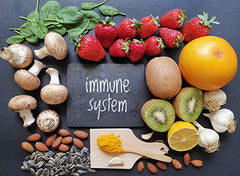Zinc has been causing quite a buzz in the world of supplements. This trace mineral is only needed by the body in small quantities, but it is found in cells throughout the body and can support everything from digestion, nerve function, healthy muscle function and immune health.* With cold and flu season just around the corner, it can be important to support wellness and maintain a healthy immune system.* This blog takes a look at this important trace mineral and how you can add it to your wellness regimen through diet and supplements like Nature's Lab Zinc Picolinate.
Why is Zinc Important?
Just like vitamins, minerals also play an important role in nutrition. Minerals needed for wellness are classified as macro (needed by the body in large quantities) and trace (needed by the body in smaller quantities). Even though zinc is a trace mineral, it is still an important component to several different biochemical reactions throughout the body.

Zinc & Digestion
Zinc is a mineral important to digestive health.*1 Zinc is released in the body as free ions. These ions are capable of binding to neutral ions before their transport into the intestines, while specific transport proteins may help the passage of zinc across cell membranes.*1 Low zinc intake may be linked to gastrointestinal distress.*1

Zinc & Metabolism
Thyroid hormones, which help the body burn fat and produce energy.*2 Thyroid hormones facilitate the metabolism of lipids and glucose and regulate metabolic adaptations.*2 Zinc may also reduce oxidative stress by acting as an antioxidant to support the metabolism of lipids, carbohydrates and proteins.*3

Zinc's Affect on Muscle & Nerve Health
Zinc has been studied for its effects on the central nervous system.*4 This essential trace mineral is the second most bioavailable trace mineral in the central nervous system.*4 Zinc may provide structural stability in various neurological functions and can support healthy enzyme activity and cell signaling.*4 Zinc is also found in the largest concentrations in skeletal muscles, making it an important mineral for muscle health.*5

Zinc & Immune Health
Zinc has been studied for its effect on immune health. Zinc deficiencies were first discovered in the 1960s, with research showing correlations between deficiencies and impacted immune reaction.*6 Zinc ions are involved in regulating immune cells to support immune health.*6 Zinc may also act as an antioxidant to support general wellness.*6
Zinc Deficiencies & Food Sources

Zinc is an essential trace mineral, meaning that the body cannot create its own zinc. Furthermore, the body does not store excess zinc, so it must be obtained daily in the diet or through supplement form. Foods high in zinc include oysters, beef, chicken, tofu, pork, nuts, seeds, lentils, yogurt, oatmeal and mushrooms. Zinc deficiencies can lead to stunted growth, appetite loss, digestive issues and impacts on immune health.*
Zinc Supplements
While many individuals get enough zinc through a varied diet, zinc supplementation can be an important addition to wellness regimens.* Supplemental zinc can be formulated with several forms of zinc, such as zinc gluconate, zinc sulfate, zinc citrate and more, with the percentage of elemental zinc and its bioavailability varying by form.
How Much Zinc Should I Take?
The minimum recommended daily allowance of zinc is 8 mg for women and 11 mg for men. The catch is, zinc is not easily absorbed by the body whether it is in food or supplement form. To reach your daily allowance you would have to ingest higher amounts of zinc.*
Zinc Supplement Dosage
To make sure you are getting enough zinc aim for 30mg-50mg and choose a form that has high bioavailability.* We’ve formulated our zinc supplement to contain 50 mg of zinc picolinate based off the latest scientific studies.*
Nature’s Lab Zinc Picolinate utilizes a form of zinc that is more bioavailable than other supplemental zinc.* In clinical trials, zinc picolinate was shown to have superior absorption properties over other forms of zinc. Picolinic acid is a natural chelator (a substance that can form several bonds to other compounds) produced in the body to help facilitate the mineral’s absorption.* Unlike other tablet varieties of zinc, Nature’s Lab Zinc Picolinate is a convenient, one-per-day serving in an easy-to-swallow vegetarian capsule.
Click here to shop Nature’s Lab Zinc Picolinate.
References
1. Roohani N, Hurrell R, Kelishadi R, Schulin R. Zinc and its importance for human health: An integrative review. J Res Med Sci. 2013;18(2):144-157.
2. Severo JS, Morais JBS, de Freitas TEC, Andrade ALP, Feitosa MM, Fontenelle LC, de Oliveira ARS, Cruz KJC, do Nascimento Marreiro D. The Role of Zinc in Thyroid Hormones Metabolism. Int J Vitam Nutr Res. 2019 Jul;89(1-2):80-88. doi: 10.1024/0300-9831/a000262. Epub 2019 Apr 15. PMID: 30982439.
3. Olechnowicz J, Tinkov A, Skalny A, Suliburska J. Zinc status is associated with inflammation, oxidative stress, lipid, and glucose metabolism. J Physiol Sci. 2018;68(1):19-31. doi:10.1007/s12576-017-0571-7
4. Gower-Winter SD, Levenson CW. Zinc in the central nervous system: From molecules to behavior. Biofactors. 2012;38(3):186-193. doi:10.1002/biof.1012
5. Hernández-Camacho JD, Vicente-García C, Parsons DS, Navas-Enamorado I. Zinc at the crossroads of exercise and proteostasis. Redox Biol. 2020;35:101529. doi:10.1016/j.redox.2020.101529
6. Wessels I, Maywald M, Rink L. Zinc as a Gatekeeper of Immune Function. Nutrients. 2017;9(12):1286. Published 2017 Nov 25. doi:10.3390/nu9121286
This article is for informational purposes only. It is not, nor is it intended to be, a substitute for professional medical advice, diagnosis, or treatment and should never be relied upon for specific medical advice. To the extent that this article features the advice of physicians or medical practitioners, the views expressed are the views of the cited expert and do not necessarily represent the views of Nature's Lab or its affiliated brands.





